Contents
“We were worried about things getting out of control. So we insisted that the outsourcing company use version control (one of the release management DevOps tools) so we could track their changes.
They did what we asked, but we noticed some very funny pictures…obviously, they were very “committed”, but the majority of tasks were done by an unknown user!”
It could be a good joke, but unfortunately, it is a real story!
Like this person, you might also want to know how to outsource tasks for your company in a way that gets good results and lets you keep control of the situation. You might be ready to take a dive down the rabbit hole to explore the possibility of working with DevOps engineers.
Perhaps you are already thinking about hiring a DevOps team, but are not sure how to control them. Maybe you are wondering: can they really bring in the results I want?
To effectively control the companies to which you outsource tasks – such as DevOps – you need to first understand who they are and their key roles and core responsibilities.
After all, an important part of being a successful manager is having a clear understanding of who is responsible for each task.
Seeking guidance from DevOps consulting services can provide you with insights into structuring and managing your DevOps team effectively.
Who is the DevOps team?
“Dev” refers to software application development and “Ops” refers to operations. To make it simple, the role of the DevOps team is to break the wall between the developers who write code and the operations team members who communicate with customers.
DevOps are a unique, specialized kind of engineer. They are like secret agents whose role is to find the problem and fix it quickly.
DevOps engineers are comparable to highly skilled interpreters. Imagine someone invented an application that translates complex human gestures and phrases into straightforward sentences. Such a valuable application! What leader does not want to know what their team members are really thinking?
This is the same job a DevOps team performs for developers and operations teams. DevOps engineers take communications from the operations team and translates them into a language the developers can understand. And the good news is that DevOps engineers do it automatically using special software!
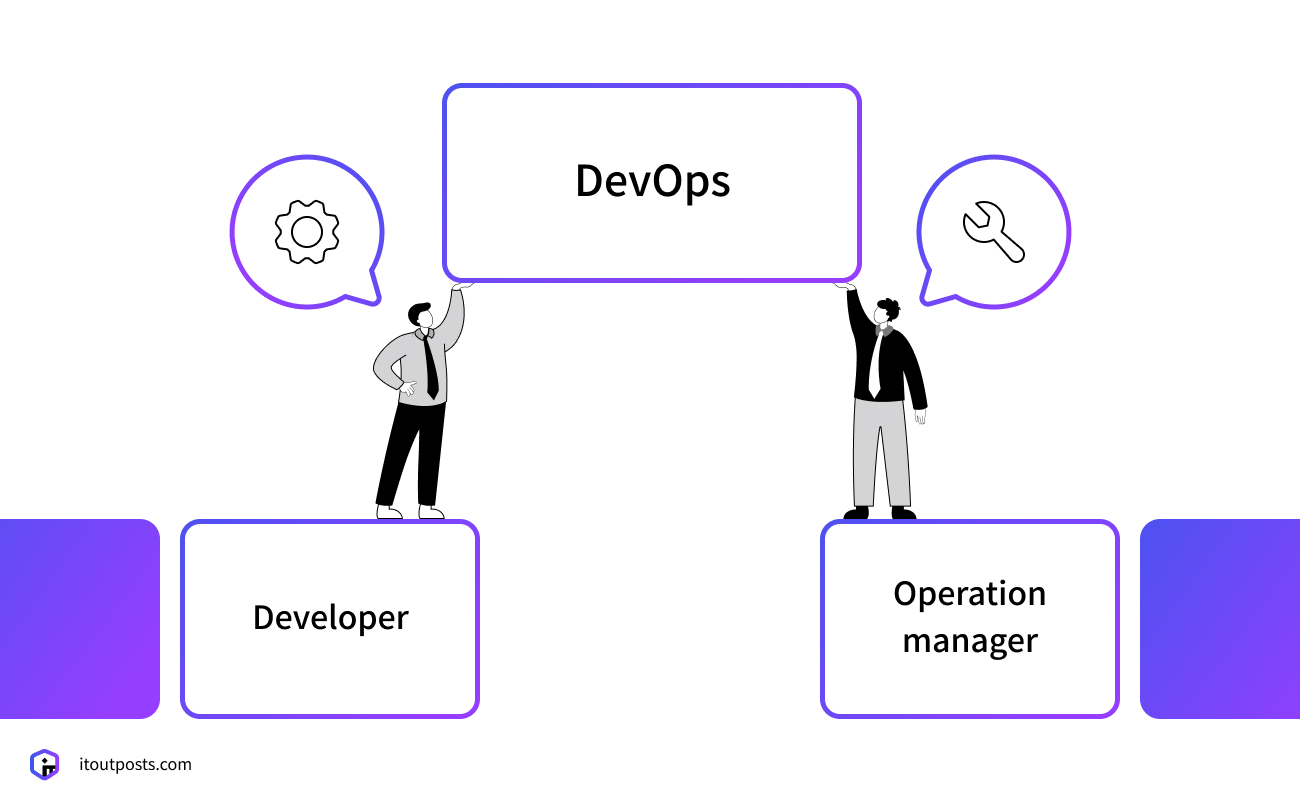
What do DevOps do?
So how do these rare specialists help you? Imagine you are a private detective who is looking for missing treasure.
Your client called the police but they cannot help, so you are their last hope. Your mission is to interview everyone who was there when the treasure disappeared, figure out which witnesses are lying and which are telling the truth, and, finally, find the treasure.
This is what DevOps engineers do for your business. They analyze every single process in your code (the witnesses) to find the broken link in the chain (the liar) that is keeping you from getting your desired results (your treasure!)
“IT organizations (with DevOps adoption) were more agile and reliable, deploying code 30 times more frequently with 50 percent fewer failures.”
Does this sound like you? A problem has developed in your app. Your operations team is sending you thousands of notifications from angry clients.
You are tired of hearing their complaints about bugs or security issues – permanent bugs, unresponsive pages, or even server overloads. You just want the application to work.
But when you call your developers, you have difficulty explaining what you want them to do. You realize now that writing a code is not enough.
You need someone who can help the developers fix mistakes. You need someone smart to find exactly what the problem is, and explain it to your developers so they can fix it.
A DevOps team will do this job for you. They use a special software designed to translate the needs of the operations team into code language for developers.
But what are the other benefits of working with DevOps?
DevOps run an automated set of test scripts on your application, which immediately demonstrates what passes or fails.
For one thing, there will be less busy-work for developers because they know exactly WHAT to fix before the problem gets too big.
With faster repairs, you will get less angry reviews, and the reputation of your application will rise much higher. Your application will be reliable instead of constantly being down because of overloads.
This is because DevOps engineers use software that optimizes your resources, so your application will respond quickly regardless of the number of visitors.
If someone were to delete all your databases (like what happened at GitLab), your DevOps team will help you recover everything quickly. You will get more satisfied customers and positive reviews that convert into even more sales for your company.
Read also: Seven DevOps Automation Tools
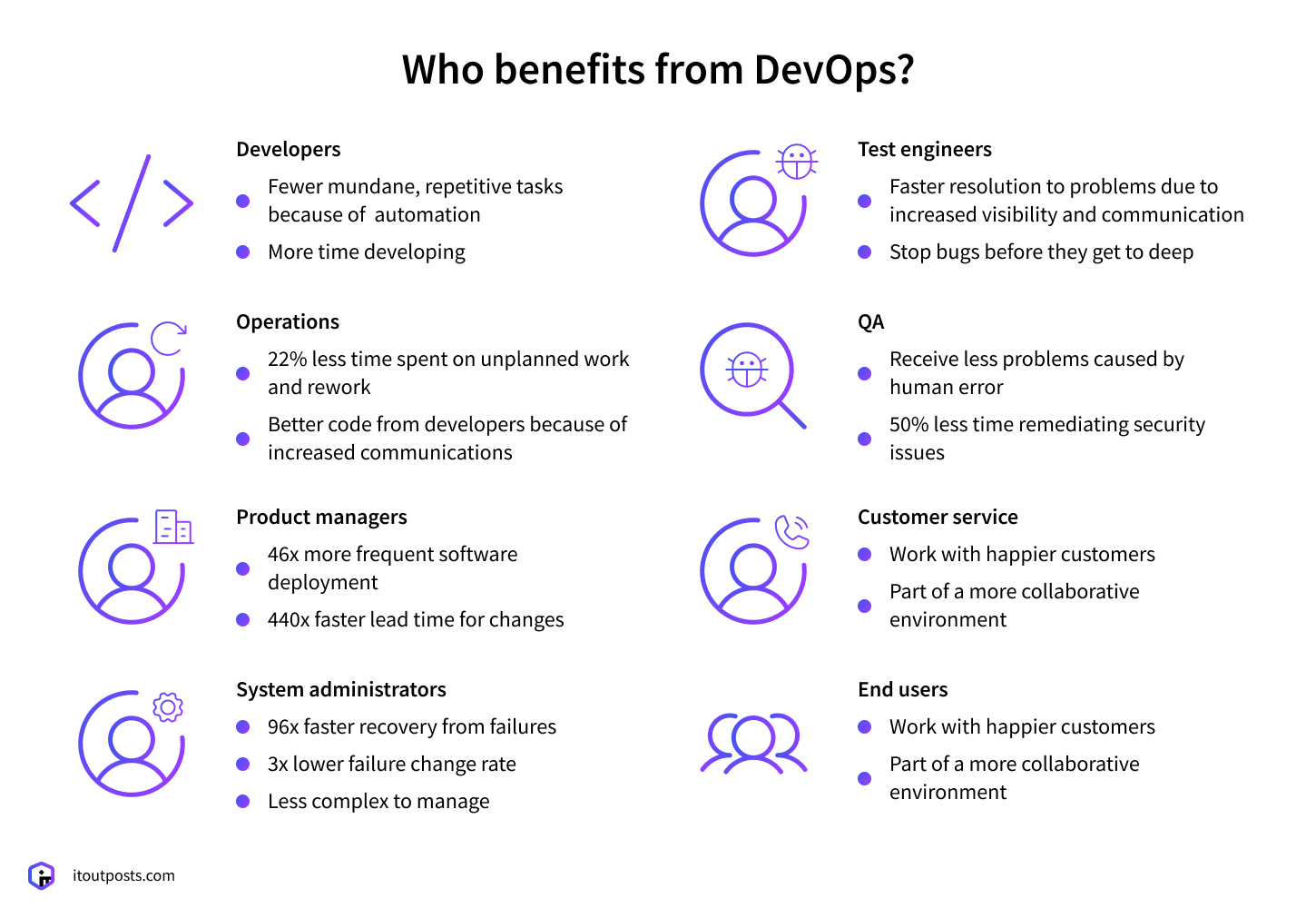
Look at these 20 DevOps pioneers who adopted DevOps practices in their business!
Thanks to DevOps, GitLab had a fast recovery period and clients did not migrate to another service.
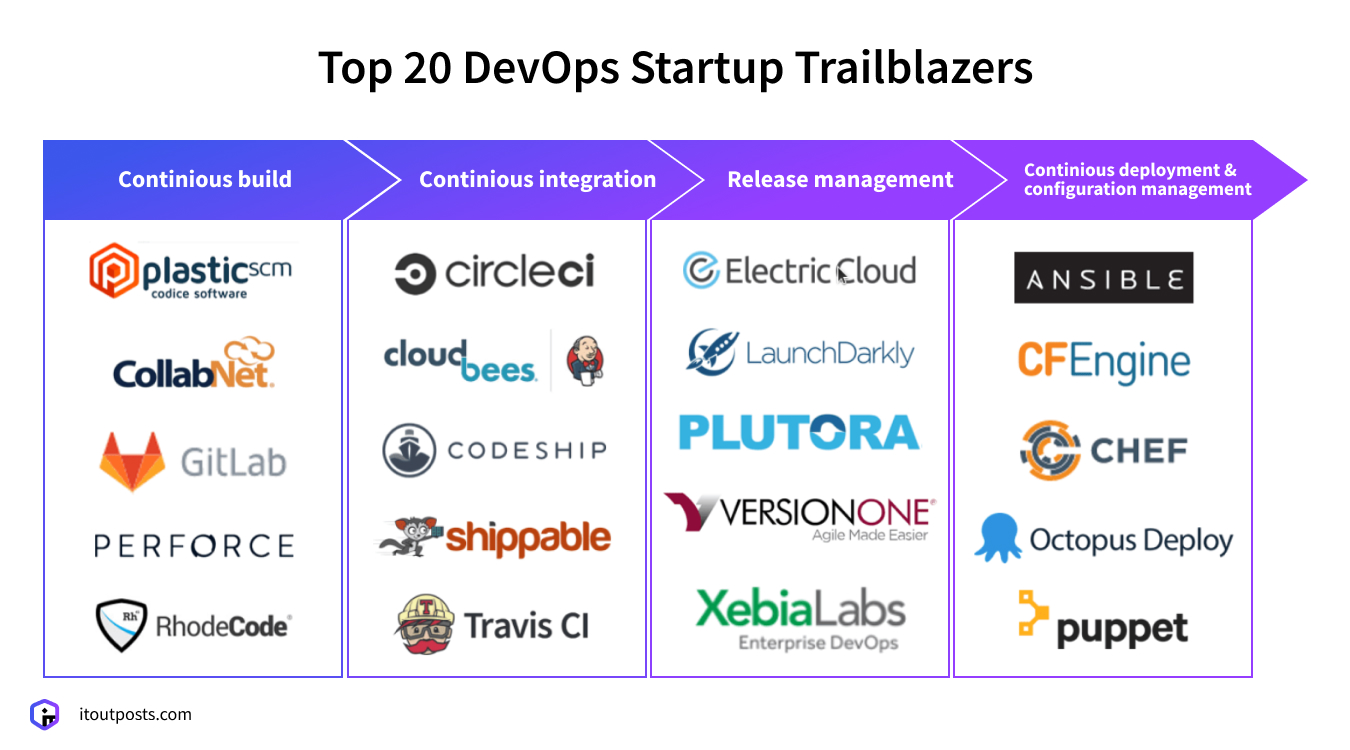
What is DevOps responsible for?
I know what you are thinking: before you start, you need to know how to control the DevOps team. In order to do that, you have to understand their role in your business and what they are responsible for.
The structure of a DevOps team is really quite simple. It consists of a DevOps Evangelist who interacts with five key people (on the client’s side):
- DevOps Evangelist – This is the DevOps manager. They will implement DevOps tools into your application and coordinate the roles in the team.
- Release Manager – This person is responsible for releasing new features of your application. They will ensure that your post-release version is stable and works smoothly without any bugs.
- Automation Expert – This person will automate all processes for your application.
- Software Developer/ Tester – This person will develop and test the code for your application.
- Quality (User experience) Assurance – This person will monitor your customers’ feedback, and ensure the quality of the product responds to its declared features.
- Security Engineer – This person will monitor the product’s security & health, and give you suggestions on how to repel hacker attacks.
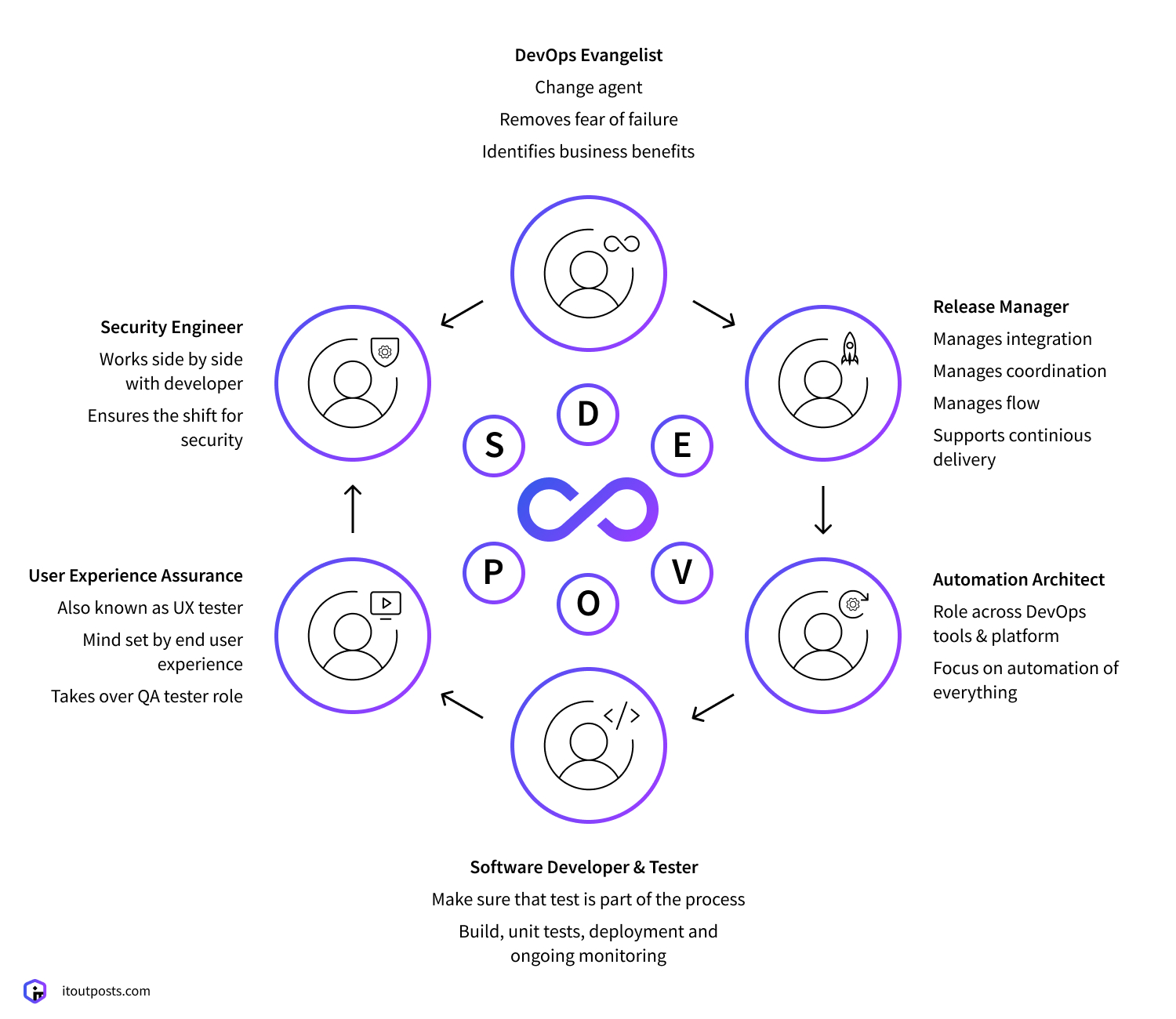
Best practices of controlling DevOps
How do you control the quality of your DevOps team’s work? Here are a few simple, practical pieces of advice that will help you work more efficiently with them.
- Sign a contract. Use a lawyer to help compose and review the contract carefully before signing. Write in all your expectations and desired results for the collaboration clearly and in detail. This information will help you protect yourself in case they are unable to deliver expected results, and maintain better control over the situation. Check that the whole contract is clear to you. Write in plain and simple language about possible risks and losses, extraordinary situations, fees, and expenditures.
- Do regular meetups. Put regular meetings with your DevOps team in your calendar. It can be face-to-face, by video, phone, or email. In these meetings, make sure that you are reviewing not only what needs to be done and when, but also what was done, by whom, and why.
- Ask for daily status reports, monthly work logs, and reports. This will help you stay up-to-date, and also give you proof if DevOps fails to accomplish their tasks. Ask your DevOps Evangelist to send you daily reports (in emails or chats) before meetings. In the meetings, discuss the progress on your tasks and the goals.
- Get compensation for failed deadlines or unachieved goals (individual plan only). If you assign an individual contract, include a clause about financial compensation if the DevOps team cannot finish the task ontime. Insist on compliance with the rules and get paid for their mistakes.
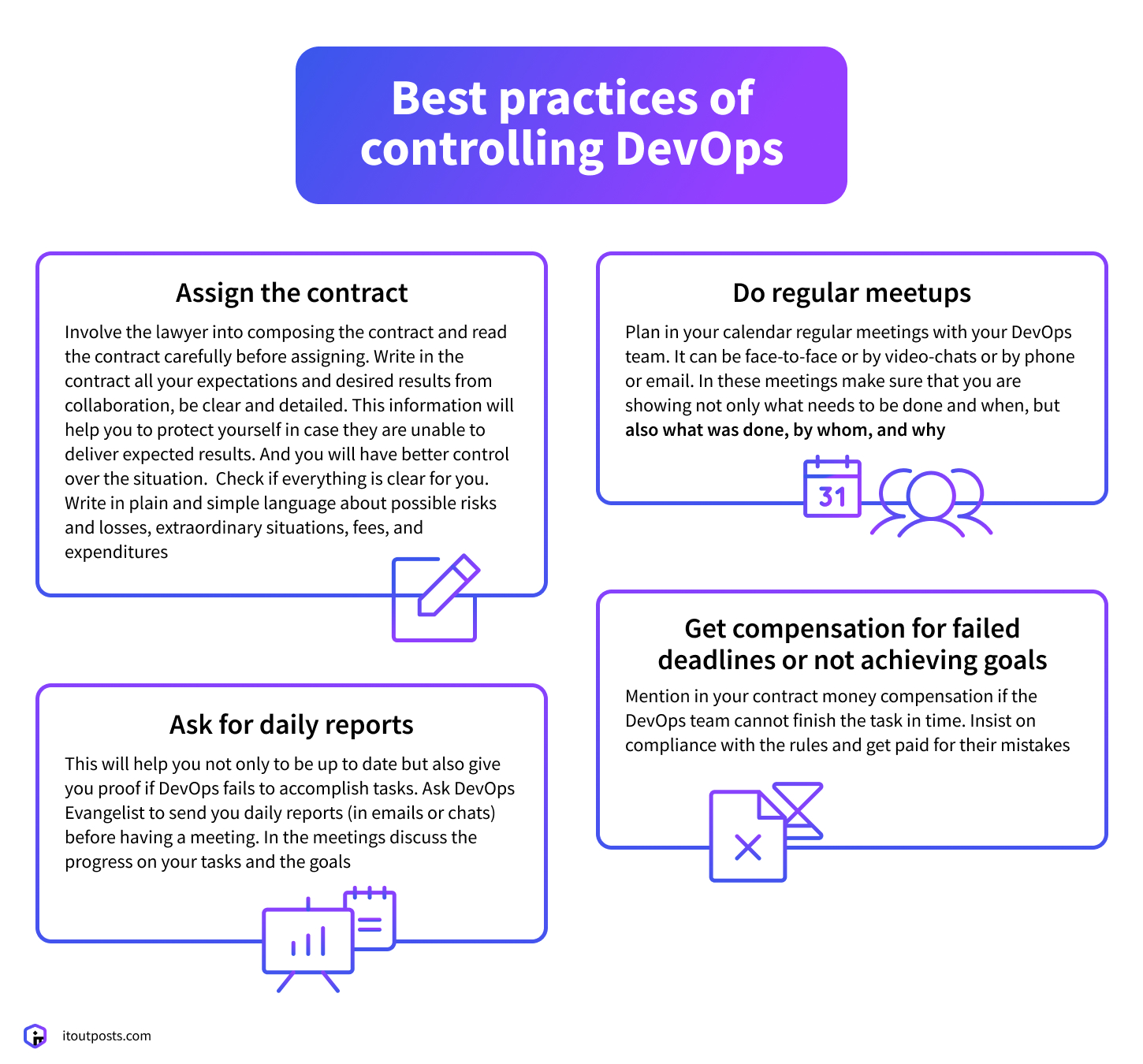
Controlling your DevOps team can be easy if you set clear tasks and practice regular communication with the team. Keep in mind the main responsibilities of each DevOps member and ask for reports.
I want to begin. How do I start?
Write to us and get a free consultation on your project NOW. Talk with our DevOps team directly and describe your project requirements. We will provide ready solutions, based on our previous experience.
FAQ
Can DevOps engineers show me the mistakes in my code?
Yes, that is their job!
What is the best way to control my DevOps team?
Set clear goals and track progress on a daily basis.
Who is responsible for my project in DevOps?

I am an IT professional with over 10 years of experience. My career trajectory is closely tied to strategic business development, sales expansion, and the structuring of marketing strategies.
Throughout my journey, I have successfully executed and applied numerous strategic approaches that have driven business growth and fortified competitive positions. An integral part of my experience lies in effective business process management, which, in turn, facilitated the adept coordination of cross-functional teams and the attainment of remarkable outcomes.
I take pride in my contributions to the IT sector’s advancement and look forward to exchanging experiences and ideas with professionals who share my passion for innovation and success.